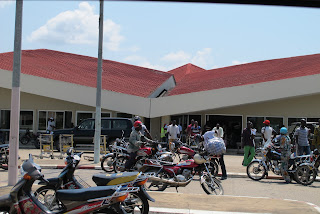In order to observe INCEF’s program implementation and the
application of their communication methodology, I am going to the northern town
of Impfondo, about 500 miles from Brazzaville, along with one of INCEF’s
educators. There, we will meet with another INCEF educator who lives in
Impfondo, and we will visit an outlying village to screen films on basic health
as well as violence prevention, part of a UNICEF-funded project on which INCEF
is currently working. The purpose of this trip, from my research perspective,
is to give me the opportunity to observe INCEF’s communication methodology in
action. While it is always valuable to listen to the descriptions and
explanations of this methodology from other INCEF staff, observation is a key
part of my research, and this current project around Impfondo is the only one I
will have the chance to see on my visit.
We must fly to Impfondo, since it is not possible to drive
there and a journey by river would take at least three weeks. It is a short
flight, just about an hour, and uneventful. On its approach to land at the
Impfondo airport, the plane swings wide over the river and lines up on a runway
that ends in a green wall of vegetation. There is the usual noise and confusion
inside the airport, and more official steps to take in order for me to be
allowed to enter – I must hand over my passport, and wait as our “letter of
mission” is scrutinized by a local official. Although this is a domestic flight
and I have already been through visa and immigration procedures when I arrived
in the country, this trip to another city must also receive official sanction
and my planned activities in this area – along with those of the INCEF educator
accompanying me – must be understood and approved by local authorities.
While waiting for the paperwork to be completed, I sit in a
plastic chair in the lobby, watching the crowd of people meeting other arrivals
on our flight. There is no other flight arriving today, and no flight
departing. The airport reminds me a little bit of the old airport in Ithaca,
NY: Gate 1 and Gate 2, arrivals and departures, and not a lot of chance for
confusion or mixed up bags given the low volume of passengers. Then, one of
those encounters that reminds me I am nowhere near Ithaca: a young man walks in
carrying a hawk by its wings. He sets the bird down on the floor while he chats
with a friend, and I can see the strings tied to its legs that keep it secured.
I ask if I can take a photo, and the young man explains he uses the bird to
fish.
Outside the airport, there is a small crowd sorting itself
out as arriving passengers slowly leave. There is a woman sitting on the ground
next to a small goat, which lies in a cloth bag, looking rather dispirited. We
are being driven into town in a truck belonging to a local NGO, Medecins d’Afrique
(MDA), and we load our luggage into the back of the truck. On the way out of
the parking lot, we stop to buy some fish and chicken from women standing on
the side of the lot with their buckets. The fish go into the back of the truck
next to the luggage. Then we drive the ten minutes to my lodgings, a room
rented from the nuns who live next to the Catholic cathedral. I can already
tell that this trip is going to be a valuable learning experience, and I am
beginning to get excited to see more.
A view of the Impfondo airport from the parking lot, showing the primary mode of transportation in the area, motorcycles.
Below is a view facing away from the airport, which sits more or less at the edge of the jungle.




